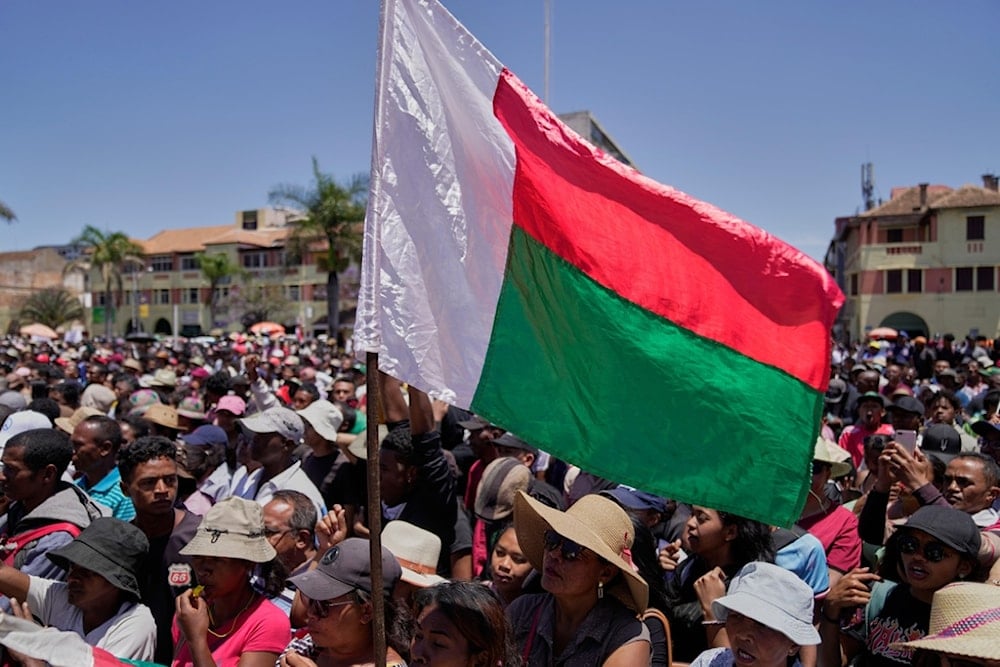Madagascar president dissolves national assembly as he clings to power
Madagascar's president is facing impeachment threats and a powerful military unit defecting to protesters demanding his resignation.
-

Protesters listen to speeches during a protest calling for President Andry Rajoelina to step down in Antananarivo, Madagascar, Tuesday, Oct. 14, 2025 (AP)
Madagascar's political crisis has escalated sharply after President Andry Rajoelina announced the dissolution of the National Assembly - the lower house of parliament - a move denounced by the opposition as "illegitimate" and taken amid growing fears of a coup attempt.
In a televised address late Monday, Rajoelina said the decision was effective immediately, just hours after opposition lawmakers declared plans to impeach him for "abandonment of post." The development comes at a time of deepening unrest, with youth-led demonstrations demanding his resignation and signs that parts of the military are siding with protesters.
"This decree is not legally valid… the president of the national assembly says he was not consulted," opposition leader Siteny Randrianasoloniaiko told Reuters, dismissing Rajoelina's order as "unconstitutional".
The president, who appeared visibly shaken during a Facebook livestream earlier in the day, said he was taking refuge in a safe location after what he described as an assassination attempt, claiming there had been an "illegal attempt to seize power." He did not confirm reports that he had fled Madagascar aboard a French military aircraft.
Military backs protesters
The situation intensified when CAPSAT, an elite military corps, declared it had taken control of the country's armed forces and appointed a new military chief. The unit announced its allegiance to the Gen Z Mada movement, a growing protest movement led largely by young people demanding Rajoelina's resignation.
Gen Z takes power in Madagascar:
— Cyrus (@Cyrus_In_The_X) October 14, 2025
After weeks of protests led by the “Generation Z Madagascar” movement, President Andry Rajoelina fled the country.
The uprising, joined by unions and parts of the army, began over corruption and living conditions.
Now, the nation will reportedly… pic.twitter.com/eS2b1ocnDA
Rajoelina's latest decree dissolving the assembly is seen as an effort to reassert authority amid the shifting power balance. His administration also announced the appointment of Lova Tahina Rajaoarinelina as a special advisor on institutional relations, a move interpreted as an attempt to strengthen his inner circle.
"This decree is not legally valid… the president of the national assembly says he was not consulted," Randrianasoloniaiko reiterated, underscoring the opposition's rejection of the president's move.
President under pressure
Despite his defiant tone, Rajoelina's grip on power appears increasingly precarious. The opposition has vowed to proceed with impeachment proceedings, while anti-government protests have continued to grow in scale across the capital, Antananarivo.
The president's critics accuse him of mismanaging the economy, centralizing power, and spending long periods abroad, fueling anger among citizens facing rising prices and unemployment.
Rajoelina, 51, first took power in a 2009 coup before winning elections in 2018 and again in 2023. His latest tenure has been marked by a sharp decline in public trust, and analysts say the current crisis represents his most serious challenge since returning to office.
Uncertain future
With the military split, protesters emboldened, and parliament defiant, Madagascar faces a volatile standoff with no clear resolution in sight.
Rajoelina insists he remains in control of the government, but opposition figures and sections of the armed forces appear to believe his rule is coming to an end.
Observers warn that unless mediation occurs soon, the country could slide into another period of instability, reminiscent of the political upheaval that has plagued Madagascar for much of the past two decades.
Read more: Madagascar warns of coup after military unit joins anti-gov protests

 3 Min Read
3 Min Read










